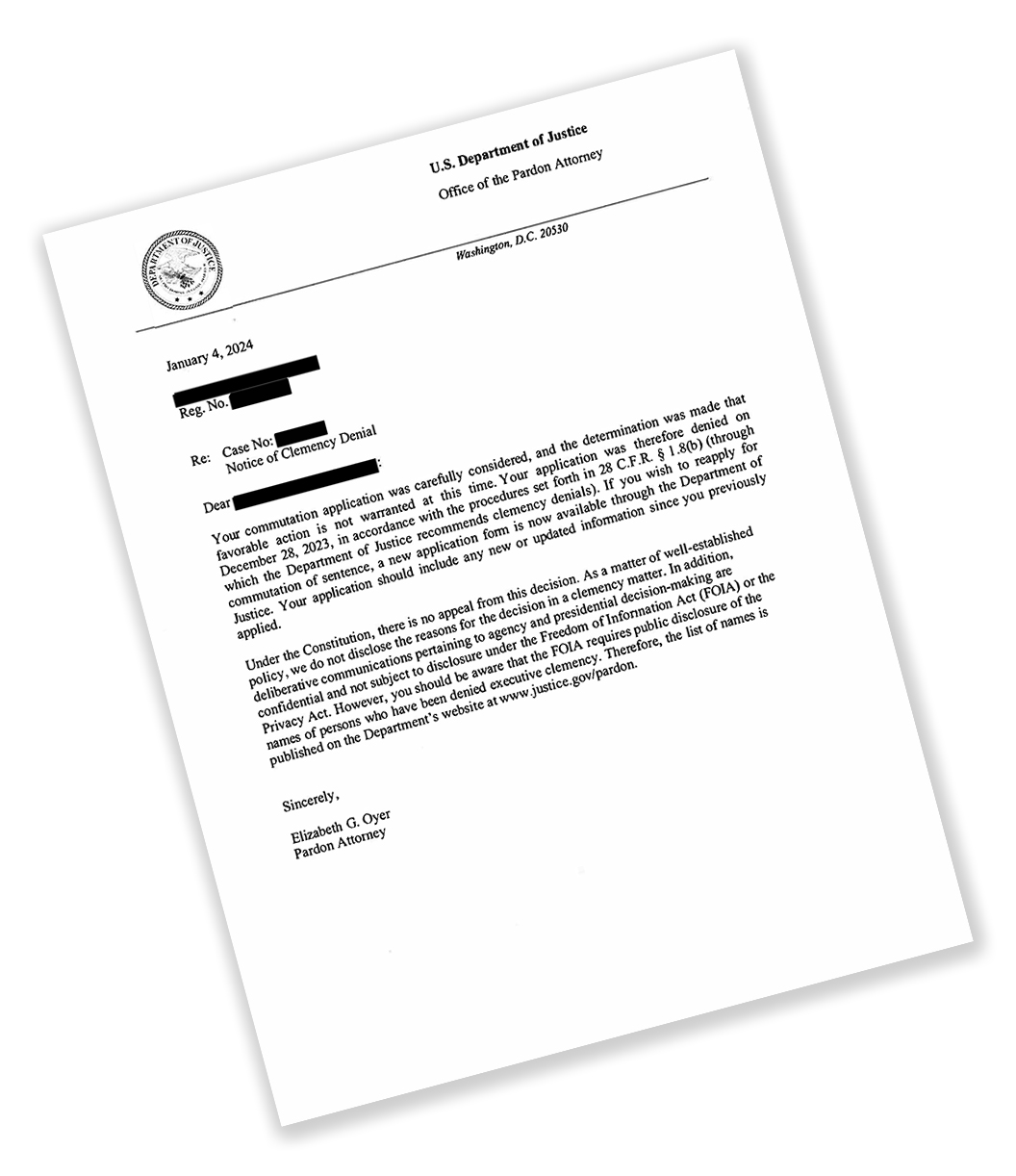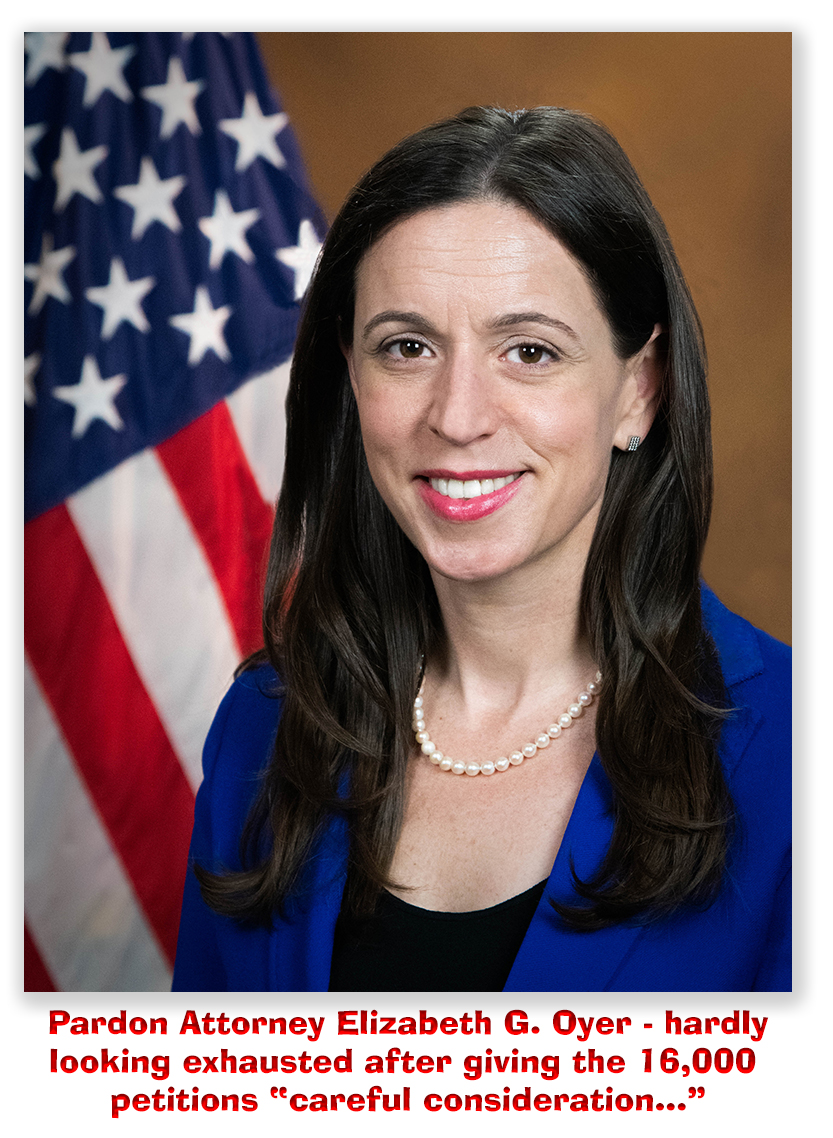We post news and comment on federal criminal justice issues, focused primarily on trial and post-conviction matters, legislative initiatives, and sentencing issues.

BIG BOX, SMALL BAUBLE
My email inbox started smoking yesterday with reports from federal prisoners that they were receiving the promised Dept of Justice Office of Pardon Attorney letters informing them that their clemency petitions – many of which had been languishing for years – had been denied. Never year, the letters advised them, because they are welcome to apply again on the new and improved form.
The letter is at once brazen in its misrepresentations and utterly incompetent in its execution. What do I mean?
 How about this? “Your commutation application was carefully considered, and the determination was made that favorable action is not warranted at this time.” Suddenly, after letting 16,000 or so clemency petitions pile up – although to be fair, most petitions were already piled high on the tables and chairs and floor when she took office – Pardon Attorney Elizabeth G. Oyer had in a few short weeks “carefully considered” all of the thousands of clemency petitions clogging the offices and corridors and made the “determination… that favorable action is not warranted at this time.”
How about this? “Your commutation application was carefully considered, and the determination was made that favorable action is not warranted at this time.” Suddenly, after letting 16,000 or so clemency petitions pile up – although to be fair, most petitions were already piled high on the tables and chairs and floor when she took office – Pardon Attorney Elizabeth G. Oyer had in a few short weeks “carefully considered” all of the thousands of clemency petitions clogging the offices and corridors and made the “determination… that favorable action is not warranted at this time.”
That’s not what DOJ said.
The current Administration inherited an unprecedented backlog of clemency petitions. Soon, the Justice Department will begin issuing letters to petitioners that have not been granted clemency in order to deliver closure to those waiting for answers they deserve. Those receiving letters are welcome to submit new petitions.
No careful consideration. No “determination” that favorable action was not warranted. just delivery of closure and an invitation to start over.
Honesty, which appears to be in short supply at the OPA, would have said, “We’re so overwhelmed with petitions, many of them years old, that we’re just throwing everything out and starting over. If you’re still interested, you’re welcome to file again.”
 And how about “[T]he list of names is published on the Department’s website at www.justice.gov/pardon?” As of January 10, 2024, no such list can be found. So an office so dysfunctional that it can’t even rustle up a list of all of the prisoners and former prisoners whose petitions were bounced – after telling unhappy applicants that the list was online – wants prisoners to believe that their “commutation application[s were] carefully considered.”
And how about “[T]he list of names is published on the Department’s website at www.justice.gov/pardon?” As of January 10, 2024, no such list can be found. So an office so dysfunctional that it can’t even rustle up a list of all of the prisoners and former prisoners whose petitions were bounced – after telling unhappy applicants that the list was online – wants prisoners to believe that their “commutation application[s were] carefully considered.”
Or maybe the OPA doesn’t even care whether petitioners believe the assurance or not.
Sadly, this latest affront is about par for the Biden clemency approach. Sure, clemency seemed to be for sale in the Trump White House, but at least it was available, even if you had to navigate The Donald’s kleptocracy to get one. With President Biden, virtually the only people able to get clemency are the ones no longer in prison.
Which leads me to clemency experts and law profs Rachel Barkow and Mark Osler, who last week accurately described most of President Biden’s December 2023 clemency grants as just a “small gift in a big box,” according to .
Writing in The Hill, Osler and Barkow complained that Biden’s “claim to ‘have exercised my clemency power more than any recent predecessor has at this point in their presidency’ is pure hyperbole, but underneath might be the seed of a truly significant movement towards more meaningful uses of federal clemency.”
First, the hollow gesture: Biden’s pardon of people convicted of simple marijuana possession underwhelms. The Sentencing Commission estimates that more than 6,500 people are covered by the pardon but only 110 people have applied for the pardon so far.
The commutation of sentences of 11 people who were serving extraordinarily long sentences for nonviolent drug distribution offenses is more significant, Barkow and Osler say, but “eleven grants from a backlog of more than 16,000 clemency petitions waiting for action is hardly grounds for applause.”
A few weeks before, Osler wrote in The Atlantic that federal clemency “has become a certifiable disaster, [having] withered to the point of uselessness and disrepute after decades of neglect, abuse, and administrative bloat. Petitions go through seven consecutive levels of review, wandering through the deeply conflicted Department of Justice — which sought the sentence in the first place — and the office of the White House Counsel. Not surprisingly, given this sticky muck of bureaucracy, a backlog of more than 16,000 pending petitions has built up—a striking number compared with the fewer than 2,000 pending petitions at the start of Barack Obama’s first term as president or the 452 petitions that President Bill Clinton inherited.”
The DOJ has promised a new, more streamlined process, but recalling that Biden – the “most lackluster user of the pardon power in memory [who] has done little beyond granting commutations to people who are already out of prison and pardons to minor marijuana offenders” – is the one making the promise, skepticism is the order of the day.
This week’s form-letter offal only underscores the reason such dubiousness is justified.
The Hill, Biden’s marijuana clemency grants are a small present in a big box (January 1, 2024)
The Atlantic, The Forgotten Tradition of Clemency (December 16, 2023)
– Thomas L. Root


